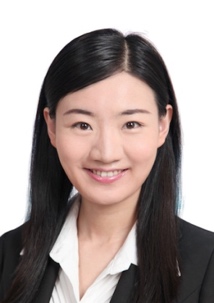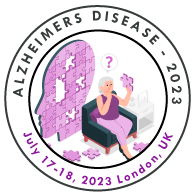
Jing Jiang
Beijing University of Chinese Medicine
Title: Effects and value of Chinese medicine nursing in Alzheimer’s disease
Biography
Biography: Jing Jiang
Abstract
Currently, 50 million people worldwide suffered from dementia, among which Alzheimer's disease (AD) accounts for 70% of the total number of dementias [1]. The main feature of AD is the obstacles of memory, thinking and behavior [2]. It is estimated that by 2050, every 3 seconds a new case of Alzheimer's disease would be reported [3]. Due to the lack of effective therapies for this disease, the current goal of AD treatment is to slow down the progress of neurodegeneration in the brain [4], so it pays more attention to symptoms relief and nursing. The aggravation of disease progress will make patients need more outside help in their daily life. Cultural differences have resulted in Chinese people preferring to live at home for a long time and prefer to be cared for by family members, so most AD patients in China were taken care of by family members [5]. Although the Chinese government had increased nursing facilities for the elderly, most of dementia patients were still like to be cared at home [6]. Because of the family members, as the caregivers, were lack of the professional knowledge about dementia, the cares of easy-to-perform and non-invasiveness were more friendly for these caregivers to help the AD patients to relieve the symptoms[7]. Therefore, based on the current form of home care for AD in China, Chinese medicine nursing techniques played more and more important role. In this manuscript, we reviewed the situations of Chinese medicine nursing on AD patients , so as to try to help promote the road of AD care.
Strategies of Chinese Medicine Nursing Techniques Intervention in Alzheimer's Disease
In recent years, massage, moxibustion, ear acupoint pressing, acupoint application,scraping and other characteristic Chinese medical nursing techniques have gradually become a new topic in caring of AD. Since these technologies are easy to operate and master, they were suitable for caregivers to help patients perform at home for a long time, and could also improve the cognitive abilities of AD patients.
Researchers [8] selected DU20 (Baihui), EX-HN 1 (Sishencong) and other acupoints on the head to perform massage interventions on 42 patients with Alzheimer's disease. The Hasegawa Dementia Scale (HDS), Mini Mental Capacity Scale (MMSE), Ability of Daily Living Scale (ADL), and Quality of Life Scale (QOL-AD) were used to evaluate the patients before the intervention, at the end of 3 months and at the end of 6 months. The results showed that the effect of the intervention for 6 months was better than that of the intervention for 3 months and before the intervention. Long-term acupoint massage could delay the progress of the disease and promote cognitive ability recovery. Chronic diseases such as AD require a longer course of treatment, and the early stages of cognitive impairment were often accompanied by mental and behavioral symptoms [9]. Among them, agitation behaviors such as walking, grabbing and biting, irritability, holding objects, and cursing were more common. In addition, research [10] also showed that hand massage could improve the agitation behavior of AD patients. Lin Meili [11] et al. treated a case of AD patients with scraping treatment and combined with cognitive function training for a total of 10 weeks, once a week, 2 hours for each time. After the course of treatment, the patients’ cognitive function and social function activities were significantly improved. Another clinical trial [12] randomly divided 60 AD patients into 2 groups, one group was given moxibustion every day, the other group was given oral medicine (Donepezil) every day. After 3 months of treatment, it was found that the moxibustion group performed better than medicine group in MMSE scores.
Moreover, different Chinese medicine nursing techniques combined could also produce better results. The results of two studies had shown that [13][14] ear acupoint pressing combined with acupoint massage could be better than single technique on AD patients in improving their cognitive function and daily living ability. So as to acupuncture combined with ear acupoint pressing. Studies found that stimulating related acupoints could promote brain blood flow, increase blood volume, and synthesize a large number of neurotransmitters in AD patients, thereby improving patients' cognitive function and improving the quality of life [15].
Conclusion
In summary, although the number of AD patients is increasing and no effective therapy to treat AD, at the initial stage of curing this disease, Chinese medicine nursing techniques still could provide a new angle for caregivers to care AD patients. In the future, more studies would provide more evidence of the mechanism and clinical efficacy of Chinese medicine nursing.

